Redditor Slammed For Leaving Dog Poop On The Curb For A Few Minutes
In life, there are often disagreements about how people handle their responsibilities, especially when it comes to pet ownership. This story from Reddit showcases one such dispute between neighbors.
OP had been handling their dog's poop in a particular way for years and had never had any issues until one day when a woman began yelling at them from her window. OP was accused of being a bad neighbor and of leaving their dog's poop on other people's lawns.
So, what was OP's dog poop routine? Well, every afternoon, they would take their dog for a walk to the mailbox. If their dog happened to poop on the way, they would bag it up and throw it into their front yard or drop it on the curb strip.
If they had to check the mail, they would simply leave the bag of poop on their property for a couple of minutes, then pick it up and throw it in the trash can when they got back. OP didn't want to carry the poop for any longer than necessary, and sometimes they would have to set it down if there was a lot of mail to carry.
But this routine didn't sit well with the woman from the window, as she started shouting at OP that it was disgusting and that the poster was a lousy neighbor for leaving their dog's poop on other people's lawns. OP admitted that they did sometimes leave the poop on the curb strip, but only for a couple of minutes and never on someone's main lawn.
OP didn't argue with the woman and simply told her that they would no longer leave the poop on her lawn. They have kept their word, but they still think about the encounter whenever they go to check the mail.
OP wasn't sure if they were doing the wrong thing by leaving the bagged dog poop on the curb for a few minutes, so they turned to Reddit to see what other people had to say about it.
OP lives in a townhouse community with shared mailboxes, and they take their dog with them when going over to check the mail
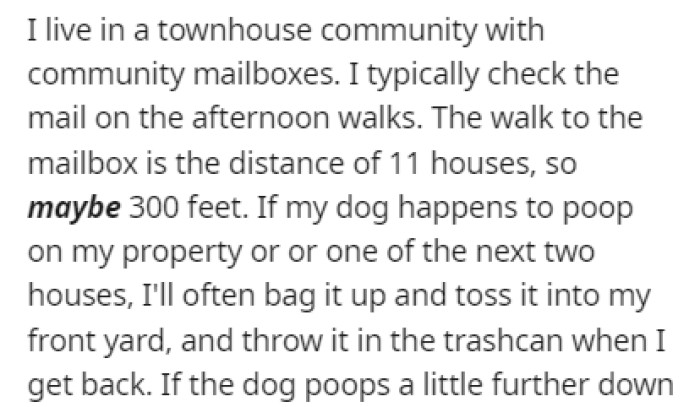
If their dog poops on their way over to the mailbox, OP will bag it up and leave it there to pick up while returning home

OP says that they don't want to carry the dog poop for longer than needed, so this was their solution
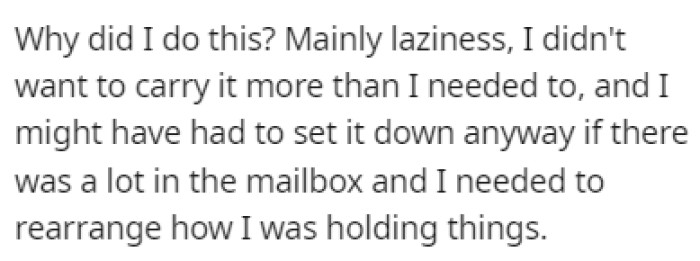
Understanding Social Norms and Responsibilities
In the realm of social psychology, the concept of social norms plays a pivotal role in shaping individual behavior, particularly in community settings. Social norms represent the unwritten rules about how to behave, and they are often enforced through social approval or disapproval. In this case, the neighbor's reaction can be interpreted as a response to perceived violations of these norms, which dictate that pet owners should promptly clean up after their animals to maintain community cleanliness and harmony.
According to Dr. Jonathan Haidt, a social psychologist, "Social norms are powerful forces that shape our behavior and can lead to conflict when violated." He emphasizes that when individuals feel their community standards are not being upheld, it can create resentment and discord. This dynamic highlights the importance of understanding how personal actions can affect communal perceptions and relationships, as noted on his professional site.
Practical solutions to improve neighborly relations involve proactive measures rooted in psychological principles. Encouraging pet owners to engage in responsible pet ownership practices, such as using biodegradable bags and promptly cleaning up waste, can foster goodwill. Additionally, community initiatives that promote shared responsibility for public spaces can enhance communal ties, as demonstrated by successful neighborhood clean-up events documented in studies from community psychology.
Moreover, creating platforms for regular neighborly interactions—like informal gatherings or neighborhood meetings—can help build rapport and understanding among residents. By emphasizing collective accountability and shared values, communities can cultivate an environment where individuals feel more inclined to communicate their concerns constructively rather than reactively. This approach not only addresses the immediate issue of pet waste but also strengthens the social fabric of the neighborhood.
Understanding Social Responsibility
From a psychological perspective, social responsibility is a key component of community living. Leaving dog poop on the curb, even temporarily, can reflect underlying attitudes about personal responsibility and community engagement.
Research from social psychology emphasizes that our actions are often influenced by the perceived norms of our environment. When individuals believe that their actions won't have consequences, they may act in ways that disregard communal values, impacting neighborhood dynamics.
OP did this for years with no issues until a woman started yelling at them from her window for doing this
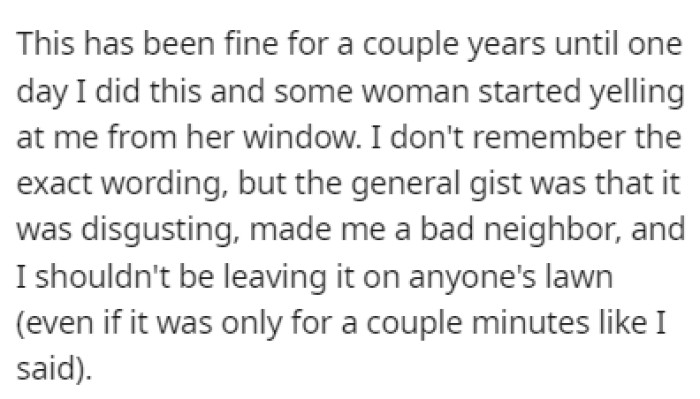
OP stopped doing it as promised, but they still think about that little encounter to this day
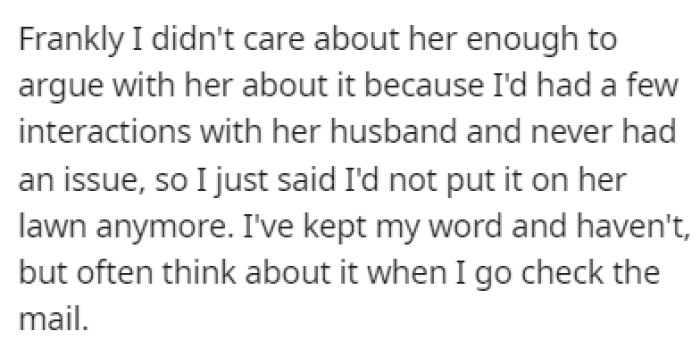
The gentlest
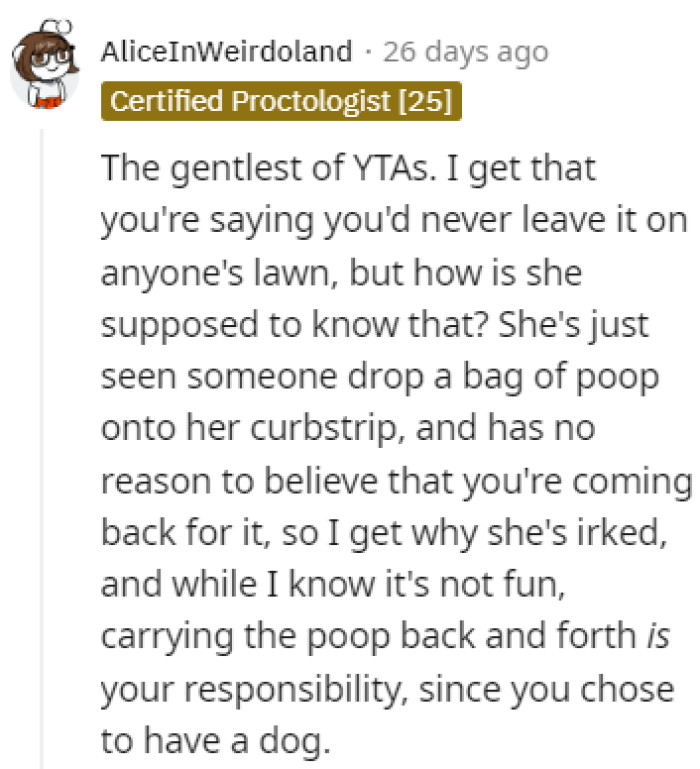
From a behavioral perspective, the reaction of the individual yelling from her window may stem from a sense of perceived threat to her environment. According to research published in the Journal of Environmental Psychology, people often respond negatively to disruptions in their environment, especially when they feel that their personal space is being violated. This study suggests that when individuals perceive a lack of consideration from others, they may react defensively, as seen in this instance.
Moreover, the emotional responses triggered by environmental stressors can lead to increased anxiety and hostility, which can exacerbate neighborhood tensions. To mitigate these reactions, open and respectful communication among neighbors is vital. Establishing friendly dialogues about community expectations can foster better understanding and cooperation between individuals.
Behavioral psychologists suggest that this scenario illustrates an important concept known as the 'bystander effect.' In situations where individuals feel that others will take responsibility, they may hesitate to act themselves.
This tendency can lead to a breakdown in communal responsibility, where everyone assumes someone else will clean up the mess.
Part of the job
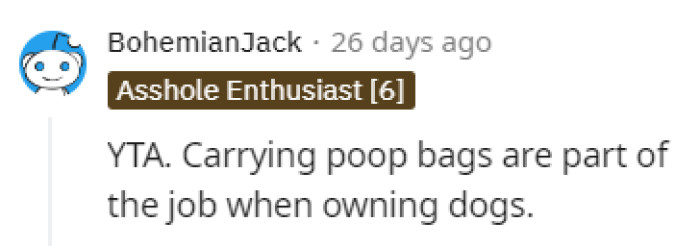
It's their dog
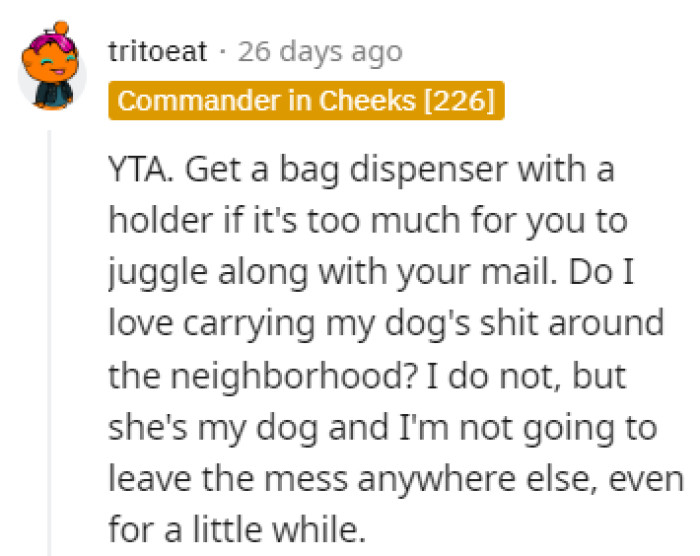
There's a solution
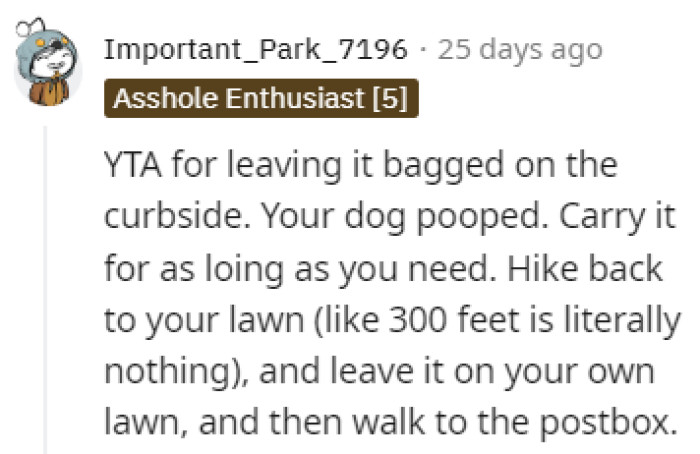
The Role of Empathy in Conflict Resolution
Empathy plays a crucial role in navigating conflicts, especially in community disputes. Dr. Brené Brown, a renowned researcher on vulnerability and empathy, emphasizes that understanding others' perspectives can significantly reduce tension and promote resolution. The Reddit incident illustrates a gap in empathy, where the neighbor's emotional response may have stemmed from her own experiences and values regarding cleanliness, while the dog owner may not have realized the impact of their actions on others.
Research indicates that fostering empathy can lead to more effective conflict resolution strategies. For example, a study published in the Journal of Conflict Resolution found that individuals who engage in perspective-taking—actively considering how the other person feels—are more likely to reach mutually beneficial solutions. Encouraging neighbors to express their feelings and actively listen to one another can create a more harmonious living environment.
Exploring Emotional Regulation
Emotional regulation plays a significant role in how we perceive and act in social situations. Research indicates that when individuals experience stress or anxiety, their ability to make rational decisions can be compromised.
This could explain why someone might leave their dog's waste unattended, as they might be preoccupied with other stressors that cloud their judgment.
No one likes dog poop

Pet ownership comes with a lot of responsibilities, and one of those responsibilities is to dispose of your pet's waste properly. How you choose to do that is up to you, but it's always important to be considerate of your neighbors and to communicate with them if there are any issues.
After all, we all want to live in a harmonious community, and small gestures like being mindful of how you dispose of your pet's waste can go a long way in achieving that.
To address these behaviors, experts recommend fostering a stronger sense of accountability within communities. Programs that encourage communal cleanup efforts can enhance social ties and promote responsible pet ownership.
Additionally, educating pet owners about the ramifications of leaving waste unattended can cultivate a culture of responsibility, ultimately benefiting the community.
Psychological Analysis
This behavior reflects a lack of consideration for communal spaces, possibly stemming from a misunderstanding of social responsibilities. Individuals often prioritize their immediate tasks over communal obligations, which can lead to conflicts within neighborhoods.
Understanding these dynamics is essential for fostering a sense of community and encouraging responsible pet ownership.
Analysis generated by AI
Analysis & Alternative Approaches
Research in community psychology underscores the importance of shared responsibility in fostering healthy neighborhoods. When individuals understand the impact of their actions on others, it can enhance community cohesion.
As studies show, 'Civic engagement increases when individuals feel a sense of belonging and responsibility to their neighbors,' highlighting the need for collective accountability.
Behavioral Analysis & Pathways Forward
Behavioral specialists note that tensions like those illustrated in this Reddit story are common in community living, where differing opinions on personal responsibility can collide. Research consistently shows that enhancing communication and empathy among neighbors can significantly reduce conflict and improve relationships. By fostering an environment of understanding and shared responsibility, communities can create a more harmonious living space where individuals feel valued and respected. Ultimately, it’s about cultivating a sense of belonging and shared purpose, which is essential for any thriving community.



